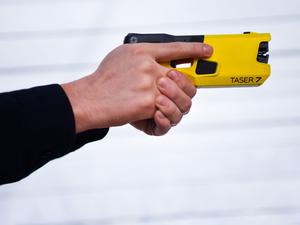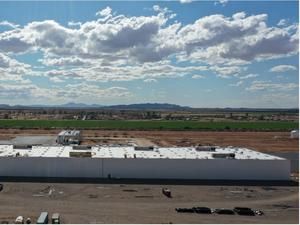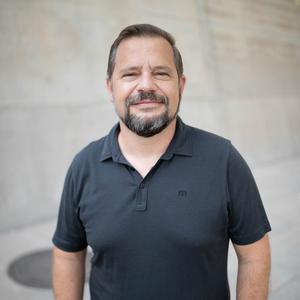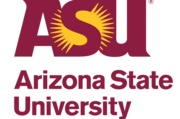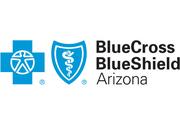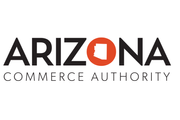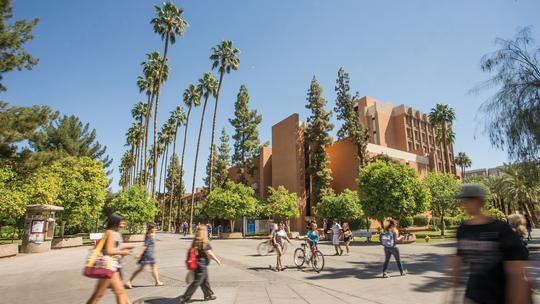
Like many young people, Jim Weingartner wasn’t exactly sure what he wanted to do when he finished college. After graduating from Arizona State University with a degree in economics in December 2019, the onset of the Covid-19 pandemic put his life into a new perspective.
He thought an MBA would be his best path toward building a company that would help people, until he heard about a new master's program at ASU.
The Master's of Science in Innovation and Venture Development (MSIVD) is a collaboration between ASU’s Ira A. Fulton Schools of Engineering, the W. P. Carey School of Business and the Herberger Institute for Design and the Arts. MSIVD is a one-year program designed to give students hands-on experience and applicable guidance building their own ventures.
Thirty-four students enrolled for the inaugural MSIVD program, which started in August 2020, and last month four teams won a combined $40,000 in seed money after an internal pitch contest. Weingartner and his app that connects and supports flea markets vendors was the biggest winner, taking in $15,000.
“I was sweating, choking, stuttering. I mean, it was just ... it felt awful,” he said, describing the nervousness he felt pitching his company. “But when I heard that I had won it was just like my heart just sank to my stomach and all I could think of in that moment was like, my brother Tommy, just internally thanking him for getting into this position to do what we did.”
Weingartner is building the app, called Buylo, with the help of his older brother Tommy, a doctoral student at the University of Florida. So far it's just the two brothers building the app, but Weingartner said they’ll use the money to bring in a part-time software designer.
The lived experience
The MSIVD program is run by Cheryl Heller, a professor of practice in innovation design at ASU’s Herberger Institute. Heller previously founded a master’s program in social design at the School for Visual Arts in New York City.
She said blending the influences of business, design and engineering together is key, because there is no distinction between these fields in the real world.
“We wanted to give students a lived experience of doing this, most of the entrepreneurship programs are theoretical,” she said. “You need to understand how to be resilient and how to navigate uncertainty and how to make decisions when somebody isn't giving you all the information you need. And, that's what's missing, and that's what we're trying to deliver.”
The program is not an incubator, so applicants do not apply with a startup idea in hand. Heller said the program is for people who are passionate about creating and starting something.
Students in the first class come from multiple countries with ages ranging from early 20s like Weingartner to more than 50 years old. Students work with staff from each of the three colleges as well as external partners like Tom Prescott who pitch in their time, resources and expertise.
For 13 years Prescott was the CEO of Align Technologies, the company that makes the Invisalign orthodontic device and recently relocated its headquarters to Tempe. Prescott got his undergraduate degree at ASU, and after his retirement in 2015 he moved to Scottsdale.
Prescott had previously been involved with mentoring students and fostering startups at the Fulton engineering schools so he said creating a full program around this idea was a natural progression of the previous work.
"That's the core, the genesis of what led to this new masters of innovation and venture development was that the kernel is it has to be very experiential, realistic, and it has to matter," he said.
He said the program is about helping to launch companies, but also ensuring graduates leave seeing the world differently. Problem solvers, Prescott said, are valuable not just as entrepreneurs, but as change-agents working inside larger companies or systems.
Prescott was joined by Michael Hool and Jonathan Coury of Hool Coury Law in Phoenix, Tammy McLeod of the Flinn Foundation, and local entrepreneur Lisa Parker on the judge's panel during the MSIVD demo day that decided which student teams would get real money as part of their coursework.
Leap of faith
It’s hard to predict the future impacts that MSIVD graduates may have, whether it be measured in dollars, jobs created or social good done. Heller said she hopes they go on to work in all types of industries, in their own companies or in others.
“I want them to have the spark and the agency and the skills and the discipline to recognize problems and solve them,” she said. “It's a program that transforms people, you are a different person when you leave, because it forces a kind of self-reflection, and forces you to find strength.”
For Weingartner, who is on track to graduate in July, the program has already delivered on the promise of transformation.
“Taking that leap of faith on MSIVD was just super incredible because it gave me the time I needed to develop my company and it has just given me the time to work on myself,” he said.
In addition to winning $15,000 for Buylo, Weingartner also said he’s lost 68 pounds since joining the program, though weight loss is not a guaranteed part of the curriculum.
